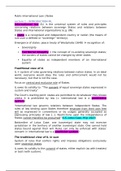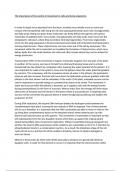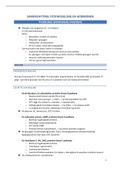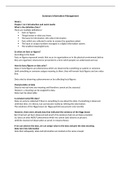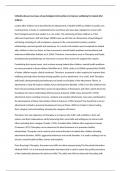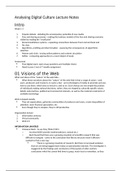Public International Law | Notes
Lecture 1 – INTRODUCTION PIL
International law (IL) is the universal system of rules and principles
concerning relations between sovereign States and relations between
States and international organisations (e.g. UN).
A state is a recognised and independent country or nation (the means of
rule over a defined or "sovereign" territory).
Emergence of states: peace treaty of Westphalia (1648) recognition of:
Sovereignty
Territorial integrity = the concept of co-existing sovereign states;
the borders of states cannot be changed by other states
Equality of states as independent members of an international
system
Traditional view of IL
IL = system of rules governing relations between nation states. In an ideal
world, everyone would obey the rules and enforcement would not be
necessary, but that is not the case.
Focus on central and exclusive role of States.
IL owes its validity to: “The consent of equal sovereign states expressed in
custom and treaty”
The Court’s starting point: states are permitted to do whatever they please
unless it is prohibited by law (= international law is a permissive
system)
“International law governs relations between independent States. The
rules of law binding upon States therefore emanate from their own free
will as expressed in conventions or by usages generally accepted as
expressing principles of law […]. Restrictions upon the independence of
States cannot therefore be presumed”(S.S. Lotus Case, PCIJ, 1927)
Bottomline of Lotus Case: one (sovereign) state may not exercise
jurisdiction in the territory of another (sovereign) state. One cannot hold
states bound against their will. Rules can only be enforced with states’
consent (= international law is a positivist system)
The traditional view of IL in sum
System of rules that confers rights and imposes obligations exclusively
upon sovereign states.
IL owes its validity to the consent of states, either explicit (as with treaties)
or tacit (with custom).
,Traditional view prevailing until mid-20th century. BUT situation always
more complex; many 20th century developments made traditional view
clearly inadequate.
,Modern view of IL
Besides States, many more actors play a role in IL:
IGO’s – League of Nations (after WWI) + UN and EU (after WWII)
NGO’s – The International Red Cross (ICRC)
Business corporations
Criminal networks
Individuals
all leading to a decline in influence of sovereign states
"Consists of rules and principles of general application dealing with the
conduct of states and of international organizations and with their
relations inter se as well as with some of their relations with persons,
whether natural or juridical” (= contemporary view)
Counter side modern view IL:
IL still predominantly made and implemented by States
IO’s are largely dependent upon states and willingness of their
governments to support them
Only states can be members of the UN (only states can call upon
the UN Security Council if there is a threat to international peace
and security)
Only states may appear in contentious proceedings before ICJ
The historical development of IL (in a nutshell)
Origins of IL: Middle Ages and the Renaissance
International community
The church (canon law)
Natural law
The collapse of the Byzantine Empire
Great geographical discoveries
The rise of nation states
, Emergence of States: peace treaty of Westphalia
Treaties of Westphalia in Munster and Osnabruck October 24, 1648.
Ended the 30 years’ war in the Holy Roman Empire
Ended the 80 years’ war between Spain and the Dutch Republic
Legacy: establishment of the precedent of peace established by diplomatic
congress and a new system of political order in Europe based upon the
concept of co-existing sovereign states (principle of territorial integrity).
Founding father of modern IL
Hugo Grotius (1583-1645)
Diplomat, lawyer, magistrate, scholar, and teacher.
In 1634, Grotius was appointed Ambassador of Sweden to France.
He helped to negotiate a Treaty for ending the Thirty Years War.
As one of the natural law pioneering theorists he defined natural
law as a perceptive judgement in which things are good or bad by
their own nature.
Famous not only for his theories of natural law, but for his books on
international law of war and issues of peace and justice.
In 1609, Grotius published Mare Liberum (Freedom of the Seas) = a
key aspect in the communication between nations and peoples and
that no one state should be permitted to monopolize control over
the seas and oceans.
One of the first modern theorists to systematically propose the
existence of norms in the conduct of relations between states.
In 1625, De Jure Belli ac Pacis: questions of jus ad bellum (“right to
war”) and jus in bello (“rules of war”). War was considered a
‘necessary evil’. Grotius discussed problems related to war in order
for the conduct of war to be regulated.
Law should be divided into what is divine and what is human.
Methods for peaceful settlement and war as a method of protecting
rights and punishing wrongs are discussed.
Lecture 1 – INTRODUCTION PIL
International law (IL) is the universal system of rules and principles
concerning relations between sovereign States and relations between
States and international organisations (e.g. UN).
A state is a recognised and independent country or nation (the means of
rule over a defined or "sovereign" territory).
Emergence of states: peace treaty of Westphalia (1648) recognition of:
Sovereignty
Territorial integrity = the concept of co-existing sovereign states;
the borders of states cannot be changed by other states
Equality of states as independent members of an international
system
Traditional view of IL
IL = system of rules governing relations between nation states. In an ideal
world, everyone would obey the rules and enforcement would not be
necessary, but that is not the case.
Focus on central and exclusive role of States.
IL owes its validity to: “The consent of equal sovereign states expressed in
custom and treaty”
The Court’s starting point: states are permitted to do whatever they please
unless it is prohibited by law (= international law is a permissive
system)
“International law governs relations between independent States. The
rules of law binding upon States therefore emanate from their own free
will as expressed in conventions or by usages generally accepted as
expressing principles of law […]. Restrictions upon the independence of
States cannot therefore be presumed”(S.S. Lotus Case, PCIJ, 1927)
Bottomline of Lotus Case: one (sovereign) state may not exercise
jurisdiction in the territory of another (sovereign) state. One cannot hold
states bound against their will. Rules can only be enforced with states’
consent (= international law is a positivist system)
The traditional view of IL in sum
System of rules that confers rights and imposes obligations exclusively
upon sovereign states.
IL owes its validity to the consent of states, either explicit (as with treaties)
or tacit (with custom).
,Traditional view prevailing until mid-20th century. BUT situation always
more complex; many 20th century developments made traditional view
clearly inadequate.
,Modern view of IL
Besides States, many more actors play a role in IL:
IGO’s – League of Nations (after WWI) + UN and EU (after WWII)
NGO’s – The International Red Cross (ICRC)
Business corporations
Criminal networks
Individuals
all leading to a decline in influence of sovereign states
"Consists of rules and principles of general application dealing with the
conduct of states and of international organizations and with their
relations inter se as well as with some of their relations with persons,
whether natural or juridical” (= contemporary view)
Counter side modern view IL:
IL still predominantly made and implemented by States
IO’s are largely dependent upon states and willingness of their
governments to support them
Only states can be members of the UN (only states can call upon
the UN Security Council if there is a threat to international peace
and security)
Only states may appear in contentious proceedings before ICJ
The historical development of IL (in a nutshell)
Origins of IL: Middle Ages and the Renaissance
International community
The church (canon law)
Natural law
The collapse of the Byzantine Empire
Great geographical discoveries
The rise of nation states
, Emergence of States: peace treaty of Westphalia
Treaties of Westphalia in Munster and Osnabruck October 24, 1648.
Ended the 30 years’ war in the Holy Roman Empire
Ended the 80 years’ war between Spain and the Dutch Republic
Legacy: establishment of the precedent of peace established by diplomatic
congress and a new system of political order in Europe based upon the
concept of co-existing sovereign states (principle of territorial integrity).
Founding father of modern IL
Hugo Grotius (1583-1645)
Diplomat, lawyer, magistrate, scholar, and teacher.
In 1634, Grotius was appointed Ambassador of Sweden to France.
He helped to negotiate a Treaty for ending the Thirty Years War.
As one of the natural law pioneering theorists he defined natural
law as a perceptive judgement in which things are good or bad by
their own nature.
Famous not only for his theories of natural law, but for his books on
international law of war and issues of peace and justice.
In 1609, Grotius published Mare Liberum (Freedom of the Seas) = a
key aspect in the communication between nations and peoples and
that no one state should be permitted to monopolize control over
the seas and oceans.
One of the first modern theorists to systematically propose the
existence of norms in the conduct of relations between states.
In 1625, De Jure Belli ac Pacis: questions of jus ad bellum (“right to
war”) and jus in bello (“rules of war”). War was considered a
‘necessary evil’. Grotius discussed problems related to war in order
for the conduct of war to be regulated.
Law should be divided into what is divine and what is human.
Methods for peaceful settlement and war as a method of protecting
rights and punishing wrongs are discussed.


